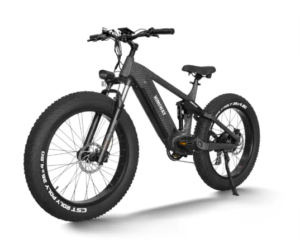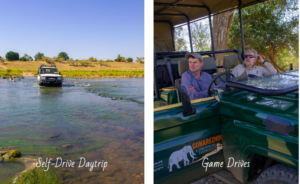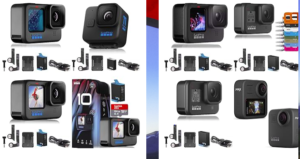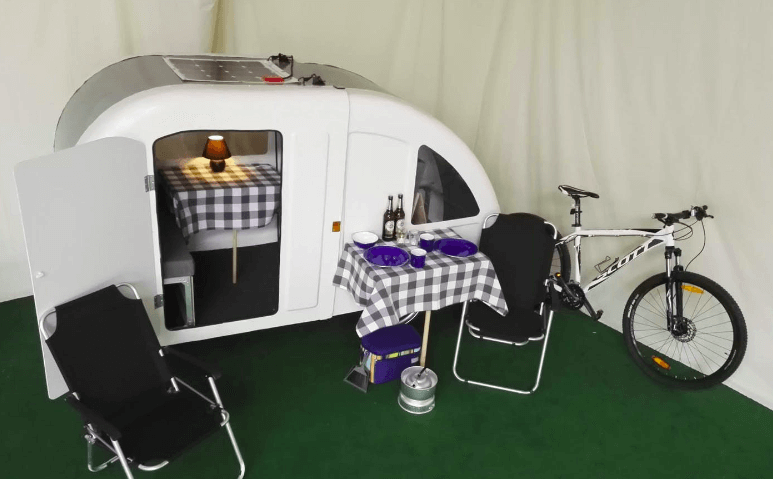
ebike camper
Who is an ebike Camper?
A person who rides an electric bicycle (e-bike) as their main means of transit while traveling is known as an e-bike camper. This person can use the e-bike to get to a campsite, tour the neighborhood, and transport equipment and provisions.
The use of an electric bicycle by an e-bike camper also allows them to reach off-road or remote camping grounds that are challenging or impossible to reach by vehicle or conventional bicycle. Ebike camping can provide a sustainable, low-impact way to appreciate nature while also giving you the freedom and flexibility to travel to new places.
As e-bikes become more broadly accessible and affordable, e-bike camping is becoming more common. E-bikes are a low-cost, low-carbon transit choice for camping excursions, and their electric engines make traveling long distances or navigating difficult terrain simpler.
Furthermore, e-bike camping can be a more environmentally responsible option to conventional vehicle camping because it lowers carbon emissions and has a lower effect on natural landscapes.
E-bike campers can experience the advantages of camping while also enjoying the independence and flexibility of e-bike transport. They can visit remote places, escape traffic, and gain entry to regions that are not accessible by vehicle.
For those who might not have access to a vehicle or who want to lessen their carbon impact, e-bike camping can also be a more cheap and more accessible choice.
What advantages do ebike campers offer?
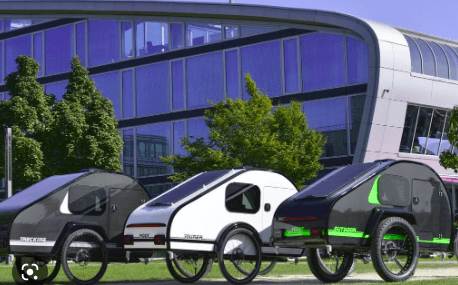
Several advantages come with using an electronic cycle (e-bike) while camping:
Sustainable transit
Compared to gas-powered cars, e-bikes are a more environmentally responsible form of transit because they are electrically propelled. They are a more environmentally friendly choice because they produce fewer greenhouse emissions and contaminants.
Cost-effective:
The cost of operating an e-bike is lower than that of an automobile or other motorized transport. They don’t need to be fueled or maintained as frequently, and their cells can be refilled for not too much money.
E-bikes are lightweight and simple to control, making them perfect for traversing trails and off-road areas.
Range expansion:
E-bikes have a greater range than traditional bicycles, making them perfect for extended camping excursions. They can also help to decrease fatigue and enable you to cover more territory in less time.
Flexibility:
E-bikes are suitable for a wide range of terrains and circumstances, from smooth tarmac to rugged off-road terrain. As a result, they are a flexible choice for discovering new regions while camping.
Health advantages:
E-bike camping is a wonderful way to get some exercise while having fun in the great outdoors. Using an e-bike to get a low-impact cardiovascular exercise can help you better your health and well-being.
Overall, using an e-bike for hiking can be a handy, cost-effective, and environmentally friendly way to discover new places and appreciate the great outdoors.
What Disadvantages do ebike campers offer?
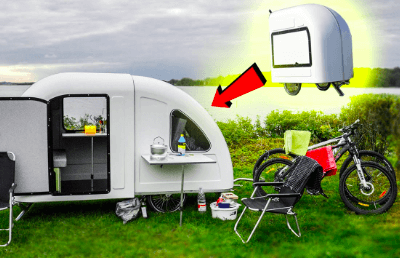
While using an electric cycle (e-bike) for camping has many advantages, there are a few possible drawbacks to take into account:
Range restrictions
Even though e-bikes can travel farther than conventional bicycles, their range is still constrained by their short battery life. This might limit your ability to visit far-off places or journey long miles without a charging point.
Charge duration:
An e-battery bike’s can take several hours to charge, which could restrict how long you can go exploring. Planning your path around charging sites or packing additional batteries may be necessary.
Cost:
E-bikes can be more costly than conventional bicycles, as can the expense of maintenance and replacement components. Furthermore, while e-bikes are less expensive to run than cars, they still require a substantial initial expenditure.
Weight:
E-bikes are typically bulkier than standard bicycles, making them more difficult to move or store. They may also need a more durable bike rack or wagon for transportation.
Maintenance:
E-bikes have more components than standard bicycles, such as a motor and battery, which may necessitate extra upkeep and fixes.
Regulations:
Some places may have rules or laws regarding where e-bikes can be ridden or camped. Before embarking on an e-bike camping journey, it is critical to study local rules and regulations.
Overall, even though e-bike camping can be an enjoyable and environmentally friendly way to experience nature, it’s essential to think about any possible drawbacks before making a choice.
Can a bike pull a camper?
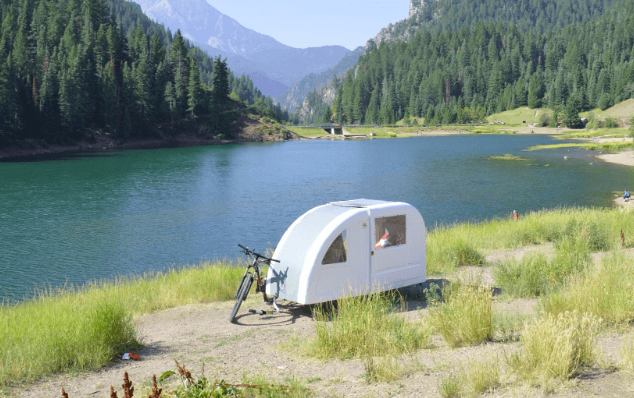
It is possible for a bike to tow a trailer, but it will rely on the camper’s size, weight, and capability as well as those of the bike.
With the aid of a specialized trailer hitch or pulling system, some motorcycles may be able to draw tiny and lightweight camping trailers, such as teardrop trailers or bike-pulled freight trailers. But it’s crucial to check that the cycle has enough strength, torque, and steadiness to pull the weight of the trailer, in addition to a trustworthy stopping system.
Towing bigger and bulkier camping trailers with a bike is usually not advised, as the weight and size of the trailer can pose a safety risk to the user and others on the road. When towing a trailer with a bike, it’s critical to consider weight distribution, wind resistance, and road conditions, as well as to always observe the manufacturer’s suggestions and safety guidelines.
Overall, while a bike can tow a trailer, it is critical to carefully consider the size, weight, and safety consequences before trying to do so.
How much does a wide path bicycle camper weigh?
A Wide Path Camper is a kind of bicycle camper, and weight differs based on the model and characteristics. However, a Broad Path Camper’s basic weight is roughly between 100 and 110 pounds (45 to 50 kg).
This weight includes the metal structure, the tent material, and other materials, but it excludes any possible additions of goods or extras to the camper. It’s essential to keep in mind that when the camper is filled with provisions and tools, its weight can rise considerably, which may have an impact on how the vehicle handles and performs.
To guarantee that the camper can be securely and comfortably towed by your bicycle, verify the manufacturer’s specs for the particular type of Wide Path Camper you’re interested in, as well as the weight capacity of your bike.
How much towing capacity do I need for a camper?
The weight of the camper itself, as well as any equipment or provisions you intend to transport inside it, will determine how much hauling capability you require. Generally speaking, your e-hauling bike’s capability should be greater than the combined weight of the trailer and its belongings.
You must know the camper’s Gross Vehicle Weight Rating (GVWR), which is the utmost weight the camper can securely transport, including its own weight and any goods inside it, in order to calculate the hauling capability you require. Usually, the owner’s handbook or a sticker or plate on the camper will have this information.
Once you’ve determined the GVWR of the camper, you can figure the estimated weight you’ll be hauling by adding the weight of the camper to the weight of any tools or supplies you intend to transport inside it. It’s essential to remember that overloading the trailer can affect its control, equilibrium, and safety, so stick to the suggested weight limits.
After you’ve estimated the weight you’ll be towing, you can look up your vehicle’s towing capability, which is usually mentioned in the owner’s handbook or on a label on the vehicle itself.
To ensure that you can transport the camper securely and easily, your vehicle’s towing capability should be higher than the weight you’ll be hauling.
A good idea is to always refer to the manufacturer’s specs and recommendations for your particular vehicle because hauling capability can differ based on the make and model of your car as well as any changes or aftermarket equipment you may have installed.
Is towing a camper hard?

It can be difficult to transport a trailer, particularly if you are inexperienced with towing or have never hauled a camper before. When towing a trailer, there are a number of things to take into account, including the campsite’s weight and size, your vehicle’s towing capability, the state of the roads, and your driving prowess and experience.
The following are some possible difficulties you might run into when hauling a camper:
Handling:
The balance and steadiness of your car may be impacted by towing a trailer, particularly in windy or hilly terrain. Due to the camper’s added weight and dimensions, you may need to modify your driving style and routine.
Braking:
Towing a camper takes more stopping distance than traveling without a trailer, so make additional room between your car and other vehicles on the road. To prevent skidding or jackknifing, you may also need to modify your stopping method.
Maneuvering:
Towing a camper can make your car more difficult to navigate, particularly in tight areas or on narrow roadways. To better your abilities and confidence, you may need to practice reversing up and turning with the camper.
Visibility:
Because towing a camper can obscure your view of the road and other vehicles, you may need to use extra mirrors or webcams to keep an eye on your surroundings.
Many people find hauling a camper to be a gratifying and pleasant experience, despite these possible difficulties. Towing a camper can be accomplished securely and easily with the right amount of forethought, preparation, and practice. When hauling a camper, it’s crucial to adhere to the manufacturer’s instructions and safety suggestions as well as to be conscious of your own constraints and comfort level.
What are the best ebike camping trailers for sale?
With a variety of features, sizes, and costs to meet various requirements and tastes, there are several different kinds of e-bike campers for sale. Here are a few illustrations of the top e-bike cabins available for purchase:
Wide Way Camper
Most bicycles can pull the Wide Path Camper, an e-bike trailer that is lightweight and small. It has a spacious bed, drawers for stowage, and solar-powered air.
ModyCycle eBike Trailer
A high-tech and opulent ebike camper with a built-in galley, toilet, and entertainment system is called the Modycle eBike Camper. Most e-bikes can tow it, and it has a strong electronic engine and battery system.
Radinnova Camper:
The Radinnova Camper is an elegant e-bike camper that can be pulled by almost any e-bike. It has a comfy cot, a fold-out table, and solar illumination and ventilation.
The B-Turtle Camper is a flexible ebike camper that can be tailored to specific requirements and tastes. It has a lightweight and aerodynamic construction, as well as a comfy resting area and plenty of stowage.
EGO e-Cruiser:
The EGO e-Cruizer is a two-person electric cycle with a built-in trailer. It has a comfy bed, plenty of stowage, and a solar-powered battery system.
These are merely a few types of the numerous e-bike cabins that are offered for sale. It’s crucial to conduct study and contrast various choices in order to select the one that best suits your requirements, finances, and preferences.
- Quietkat Ranger 5.0 Fat Tire Mountain E-bike: Ultimate choice for Mountain Riding.
- Quietkat Pioneer 750 Full Review. Best Adventure Electric Bike in 2023.
- Bakcou Storm Jager E-bike Review: Made for Outdoor Pursuits in 2023.
- QuietKat Apex 10 All Terrrain E-bike Review. What are the Pros and Cons?
- Rambo Megatron Electric Bike: Ultimate Choice for Hunting adventures.


